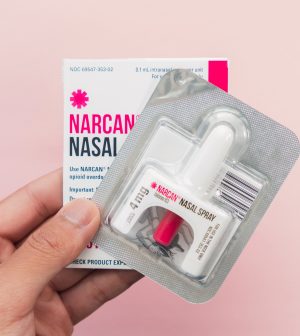- Could Your Grocery Store Meat Be Causing Recurring UTIs?
- Are You Making This Expensive Thermostat Error This Winter?
- Recognizing the Signs of Hypothyroidism
- 10 Strategies to Overcome Insomnia
- Could Artificial Sweeteners Be Aging the Brain Faster?
- Techniques for Soothing Your Nervous System
- Does the Water in Your House Smell Funny? Here’s Why
- Can a Daily Dose of Apple Cider Vinegar Actually Aid Weight Loss?
- 6 Health Beverages That Can Actually Spike Your Blood Sugar
- Treatment Options for Social Anxiety Disorder
FDA Approves First Over-the-Counter Nasal Spray for Opioid Overdoses

The U.S. Food and Drug Administration on Wednesday approved the over-the-counter use of a nasal spray that can reverse an opioid overdose.
Research has shown that wider availability of naloxone (Narcan) could save lives as the opioid epidemic rages on in this country.
“The FDA remains committed to addressing the evolving complexities of the overdose crisis. As part of this work, the agency has used its regulatory authority to facilitate greater access to naloxone by encouraging the development of and approving an over-the-counter naloxone product to address the dire public health need,” FDA Commissioner Dr. Robert Califf said in an agency news release.
“Today’s approval of OTC naloxone nasal spray will help improve access to naloxone, increase the number of locations where it’s available and help reduce opioid overdose deaths throughout the country,” Califf said. “We encourage the manufacturer to make accessibility to the product a priority by making it available as soon as possible and at an affordable price.”
Emergent BioSolutions, the Maryland company that makes the Narcan spray, made no mention of price in a statement it released after the FDA approval was announced, but the company’s president applauded the move.
The approval “marks a historic milestone as we have delivered on our commitment to make this important emergency treatment widely accessible, given the alarming rates of opioid overdoses occurring across the country,” Robert Kramer, president and CEO of Emergent BioSolutions, said in a company news release. “We are dedicated to improving public health and assisting those working hard to end the opioid crisis — so now with leaders across government, retail and advocacy groups, we must work together to continue increasing access and availability…”
Addiction experts also applauded the approval.
“The FDA’s long-awaited decision to make intranasal naloxone available over the counter is a critical step in tackling the opioid overdose public health crisis that is devastating communities across the country,” said Alex Bennett, director of the Opioid Overdose Prevention Program at the NYU School of Global Public Health.
“This over-the-counter designation is practical and symbolic: it will allow easier access to this lifesaving medication, helping to saturate communities with the medication while normalizing it as a medication that should be in every medicine cabinet, first-aid kit, backpack or car,” he added.
The approval process first gained steam last month, when FDA advisers voted unanimously in favor of making the drug easier to access after a daylong meeting that focused on whether untrained users would be able to safely and effectively use the nasal spray in emergencies, the Associated Press reported.
The recommendation came despite concerns from some panel members about the clarity of the drug’s instructions and packaging, which caused confusion among some people in a company study. Emergent BioSolutions said it would revise the packaging and labeling to address those concerns, according to the AP.
“Perfect should not be the enemy of the good, and the evidence we saw today provides clear indication that the drug can be used without the direction of a health care provider,” panel member Dr. Brian Bateman, of Stanford University, said at the time.
FDA officials who were at the meeting agreed, the AP reported.
“We believe that nonprescription naloxone may help address these barriers [in access],” said Dr. Jody Green, the FDA’s deputy division director for safety for the Division of Nonprescription Drugs. She noted that the switch would allow the drug to be sold in vending machines, convenience stores and supermarkets, the AP reported.
Although naloxone is already available without a prescription, it must be obtained directly from a pharmacist.
“Allowing it to be over-the-counter in the same manner in every state really clears up some confusion and hopefully clears up some of that red tape,” said Kirk Evoy, a clinical associate professor of pharmacotherapy at the University of Texas at Austin who has studied the issue.
Still, NYU’s Bennett wondered if price could be an issue.
“The high cost ($60-90) of the intranasal formulation will remain a barrier for many people in comparison to the much more affordable injectable formulation, which did not receive the over-the-counter designation,” he said. “Many people who use drugs have also faced stigma when using pharmacies, so that is a barrier to access at pharmacies. It is important that low-threshold, low-cost, and/or free community access to naloxone be prioritized to tackle this public health crisis.”
In the year ending August 2022, more than 107,000 Americans died of a drug overdose. More than two-thirds of those deaths involved fentanyl and other synthetic opioids, according to the U.S. Centers for Disease Control and Prevention.
Naloxone has been approved by the FDA since 1971. It was first used in hospitals and by first responders to resuscitate those who might have otherwise died of an overdose, CNN reported.
Good Samaritan laws in most states protect people who administer the medication to someone who is overdosing, CNN reported.
“The more you can administer naloxone, the more likely it is that we’ll have positive results,” Evoy told CNN. “And more likely we’ll be able to save a life with this medication.”
More information
The U.S. Centers for Disease Control and Prevention has more on the opioid overdose epidemic.
SOURCES: U.S. Food and Drug Administration, news release, March 29, 2023; Alex Benett, PhD, Director, Opioid Overdose Prevention Program, NYU School of Global Public Health, New York City; Associated Press; CNN
Source: HealthDay
Copyright © 2026 HealthDay. All rights reserved.










